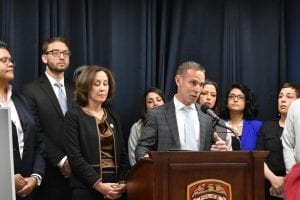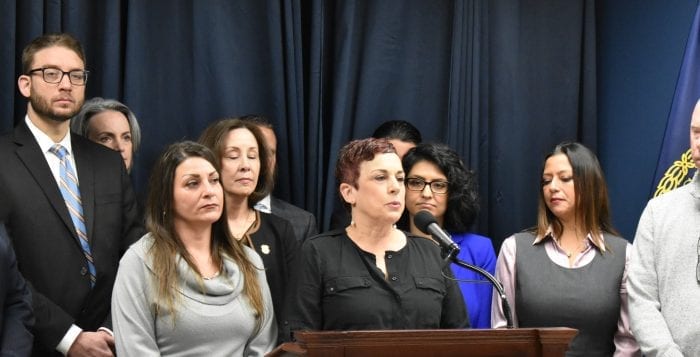Two mothers, one from Farmingville and the other from Merrick, may live on different parts of Long Island, but both had very similar experiences, watching their daughters abused in sex trafficking schemes that saw men use drugs to keep their children captive.

Lisa Principe and Maria Francavilla spoke of their experiences Jan. 31 at a Suffolk County Police Department press conference in Yaphank to round off National Slavery and Human Trafficking Prevention Month.
Principe said her daughter, Jenna, went to school at Wellington C. Mepham High School in Bellmore. She said her daughter fell in love with a man who ended up taking advantage of her in the extreme. She was gang raped at only 19 years old, as her “initiation.” She was kept in motels with a number of other girls as her pimps used her addiction to drugs to keep her under control. She would spend time in and out of jail, but as soon as she got out the traffickers were there to pick her up and bring her back into the fold.
“They took her soul,” Principe said. Even after the men keeping her were arrested, Jenna would later die at 27 from an overdose at home.
Though her hardship remains, she said she hopes new initiatives from the police will help combat the slew of sex trafficking cases happening all across the Island, targeting potential victims on the internet, in public places or even around schools.
Jennifer Hernandez, the executive director of the nonprofit Empowerment Collaborative of Long Island, which provides trauma services for victims of human trafficking and other abuse, said they have worked with more than 160 victims of trafficking just this past year.
“Most of which were born and raised right here on Long Island — in Suffolk County.” she said.
Police Commissioner Geraldine Hart said the biggest misconception about sex trafficking is that it’s men piling people, mostly immigrants, into the back of trucks and taking them away. Modern sex trafficking happens to people of all walks, immigrants and native-born Long Islanders. Traffickers take vulnerable people, mostly young women, and use a combination of drugs, violence and other emotional manipulation to control these women. There’s no single place, police said, whether rich or poor, that sex trafficking isn’t happening. The epidemic is tied to the opioid crisis that still rages in communities across the Island.
Since October of 2017, the police’s human trafficking unit has leveraged 417 charges against individuals, with 186 she said were specifically related to sex trafficking. The police has interacted with and identified over 220 women involved with trafficking since the beginning of the initiative, with the youngest one being only 12 years old.
Still with those numbers, Detective Lt. Frank Messana, the commanding officer of the department’s human trafficking unit, said they have “only scratched the surface.”
On Jan. 25, Kings Park man and alleged Bloods gang member Abiodun “Abi” Adeleke was sentenced to 25 years in prison for multiple counts of sex trafficking. He allegedly participated in this ring from 2014-18.
Last year, Sound Beach man Raymond Rodio III was arrested for allegedly hosting a sex trafficking ring at his parent’s house on Lower Rocky Point Road. Police and the county district attorney said he had preyed on more than 20 women over several years, most from Suffolk, with many floating in and out from the man’s basement apartment as his parent’s home located in a relatively middle-class neighborhood.

Rodio’s investigation originally began in 2018 when an officer witnessed a suspected victim of trafficking in the alleged perpetrator’s car during a traffic stop. Hart said such awareness and education, for not only police officers but the general public, is doing much of the job of finding and arresting sex traffickers.
In October 2017, police first piloted its human trafficking program, which then became permanent in 2018. The commissioner said in the year prior to the unit being formed, there hadn’t been any examples of sex trafficking arrests.
In 2019, the Suffolk County Sheriff’s Office started a human trafficking unit to work inside the county jails. Undersheriff Kevin Catalina said the team of officers look to identify human trafficking victims within the jail. While women are in jail for a stint, officers can get them to “open up.” Many, he said, could not even identify they were victims of trafficking, instead thinking these people were their “boyfriends.”
Francavilla had a similar experience to Principe. Her daughter, Tori, fell in with the wrong people early out of high school. She described it got to the point that her daughter was, “handcuffed to a bed and kept captive.”
She would eventually help put the perpetrator away but, like Jenna, the opioid addiction followed her even after her traumatic experiences. She died when she was 24.
Police said a person is at-risk or is already a victim of trafficking if they start to show behavior of chronically running away from home or having a history of unstable housing, demonstrates inability to regularly attend school or work, exhibits bruises or other physical trauma, withdrawn behavior, signs of drug or alcohol addiction, inconsistencies in their stories, inappropriate dress, a mention of a pimp, “daddy” or being “in the life,” suspected engaging in prostitution, history of pregnancies, abortions or sexually transmitted diseases, and looking as if they worked excessively long hours.
Identifying such a person, a resident should call 911 in an emergency, or contact Suffolk County Crime Stoppers at 800-220-TIPS (8477).
People can find more information and resources at the ECLI at www.empowerli.org.
For more information about Suffolk County’s public information initiative, visit https://scatili.org/





